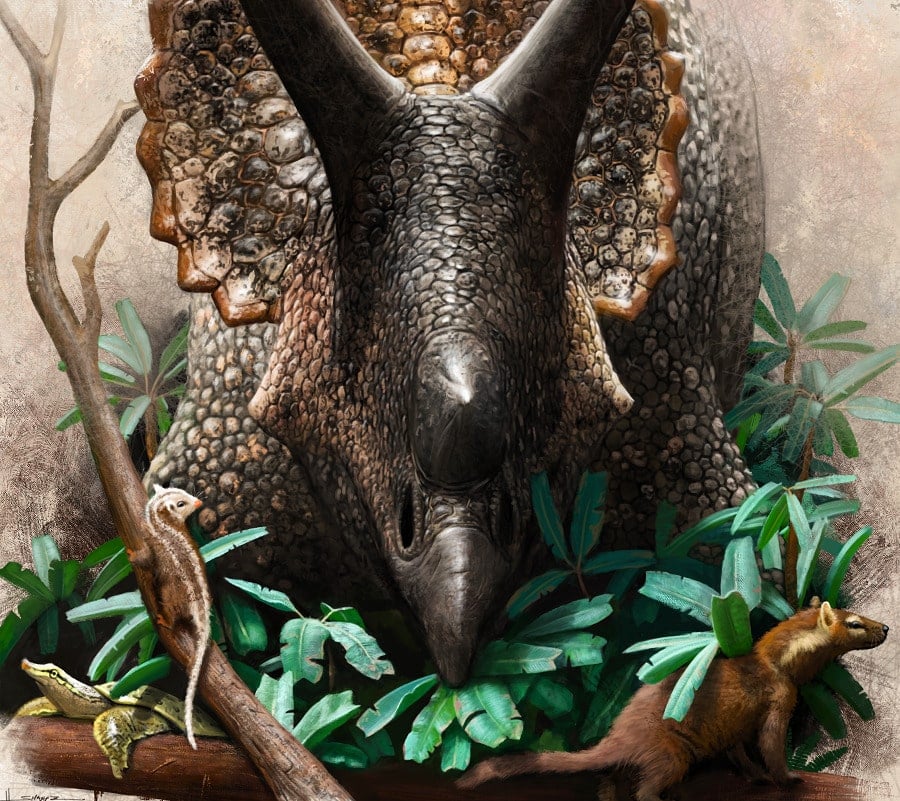(CN) — An international team of paleontologists and ecologists hope their study, published Wednesday in Science Advances, will resolve the ongoing debate on the dinosaurs’ status before an asteroid killed them all 66 million years ago.
Jorge García-Girón of the University of Oulu in Finland and the University of León in Spain said the research provides insight into "one of the age-old mysteries of paleontology: why all the non-bird dinosaurs died, but birds and mammals endured."
“We used a novel and updated database that included the most comprehensive fossil occurrences for the best studied geological deposits across the Late Cretaceous of North America,” García-Girón said. “This standardized database condensed biological information for more than 1,600 fossils from modern-day Alaska to Mexico.”
Per the study, the researchers modeled the food chains and ecological habitats of land-living and freshwater animals that lived during the last million years of the Cretaceous period as well as the first few million years of the Paleogene period — the era after the asteroid hit.
According to Alfio Alessandro Chiarenza of the University of Vigo’s Department of Ecology and Animal Biology, the dinosaurs at that point had evolved into their prime, stably occupying several environments and were ecologically diverse.
When the asteroid hit and caused a photosynthesis shutdown, Chiarenza said that it wiped out the stable environments that sustained the dinosaurs.
“All environments depending on plants for nourishing their animals got completely turned upside down,” Chiarenza said. “This a big change of a basic ecological rule to which all forms of life around at that time had to find a solution … or go extinct!”
While the dinosaurs who had adapted so well to their pre-asteroid environment scrambled to find solutions to their rapidly declining food sources and shelters, the study says that other creatures quickly adapted to the catastrophe thanks in part to their diversified diet.
“Animals like birds and mammals could easily access different sources of food, like seeds and the detritus which was still available even when primary production due to the shutdown of photosynthesis after the impact caused the crisis of all ecological networks dominated by the dinosaurs,” Chiarenza said.
For animals that lived in freshwater environments such as soft-shell turtles and crocodiles, García-Girón explained that they had another advantage over the dinosaurs.
“Inland waters have a high heat capacity, which means that it takes longer to increase (or decrease) their own temperature compared to land, protecting river, floodplain, and lake biotas against the searing fire and insurmountable air temperatures caused after the asteroid hit,” García-Girón said. “From a more long-term perspective, freshwater ecosystems protected their faunas and floras from the upheavals caused by the asteroid hit because these inland aquatic habitats are less reliant on photosynthesis as the primary food source."
Chiarenza concluded that mammals survived what dinosaurs did not because of their ability to adapt to sudden and rapid change.
“I hope the public from now on will remember that dinosaurs were going strong, with stable ecosystems, right until the asteroid suddenly killed them off,” Chiarenza said. “Meanwhile, mammals were diversifying their diets, ecologies, and behaviors while dinosaurs were still alive. So, it wasn’t simply that mammals took advantage of the dinosaurs dying, but they were making their own advantages, which ecologically preadapted them to survive the extinction and move into niches left vacant by the dead dinosaurs.”
Subscribe to Closing Arguments
Sign up for new weekly newsletter Closing Arguments to get the latest about ongoing trials, major litigation and hot cases and rulings in courthouses around the U.S. and the world.









